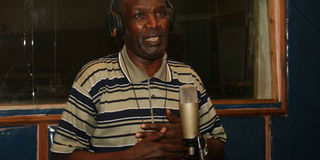Breaking News: KDF chopper crash kills five
Money-driven politics is the reality of our times

Musician Joseph Kamaru at a recoding studio in April 2009. PHOTO | LIZ MUTHONI | NATION MEDIA GROUP
What you need to know:
- Those whose loyalty has been bought can not see anything wrong with taking a few hundred shillings from politicians.
- But the overall effect is that we are all poorer for it.
Back in the late 1980s, benga musician Joseph Kamaru was reported to be contemplating running for the presidency. Having sold more than 500,000 records before the age of the YouTube, which was quite a feat, the man believed that his popularity cut across the ethnic divide and there was no reason why he should not clinch the top seat. What he didn’t know was that even then, when it was a lot cheaper to run for political office, he really didn’t have the resources.
FEW RUN-INS
The grand old man, of course, had other claims to fame. He had had a few run-ins with the authorities, especially when he composed a song seeking to know who had assassinated J.M. Kariuki, which annoyed the ruling elite. When Daniel Moi became president, the two became friends, but when he expressed support for multiparty politics, they fell out. Kamaru never officially declared his intention and, therefore, everything remains speculative.
Nevertheless, this narrative serves to illustrate the delusion that keeps cropping up on the nature of the pursuit for power in Kenya. It is never really about popularity. It is usually about drawing the crowds through hyperbole, alternative truth, outright lies, sound bites and melodrama. Many people attend the rallies either because they have nothing better to do, they have been paid to do so, or because they want to show support for their tribesman against the “enemy” who invariably belongs to the other tribe.
BETTER IDEOLOGY
Rarely do the crowds show up in huge numbers because one political party has a better ideology than the other or better policies. Rarely do they attend those rallies because their preferred leader has a better vision for the country. The whole issue is about money, and those who don’t have much have no chance whatsoever. To turn a biblical saying on its head, it is easier for a camel to go through the eye of a needle than for a poor man to enter State House these days.
Until this mentality changes, our politics will always be mortgaged to those with billions in their bank accounts, regardless of how they acquired the money. In other words, money-driven politics has become the reality of our times, and elections are bought and sold like merchandise in the market-place.
This is not necessarily a judgmental assessment of where we are but an indicator of where we are headed. We cannot keep shunting aside some of the brightest minds in the country just because they either do not have old money to rely on, or they do not have a network of wealthy funders whose only interest is to invest in victory so that they can recoup their money by looting public funds. It is not prudent to mortgage this country’s economic health to political entrepreneurs.
FINANCING LAW
And it is not as though we do not have a comprehensive Election Campaign Financing Act, which has been studiously ignored by politicians. This Act was first mooted in 2013 and then revised in 2016, but the attempt to enforce it through regulations by the IEBC was short-circuited by a parliamentary committee, and then suspended by a court of law on a technicality. The Act, which would have effectively capped campaign spending, was suspended until after this election, with the result that there are no limits to what candidates and parties can spend.
There never did seem to be much enthusiasm for the regulations in the first place, which has led to extraordinary spending that has only succeeded in pushing up inflation and slowing down the economy by making the shilling weaker.
NOTHING WRONG
Of course, those whose loyalty has been bought cannot see anything wrong with taking a few hundred shillings from politicians, but the overall effect is that we are all poorer for it.
For the 2007 election, President Mwai Kibaki’s PNU and Mr Raila Odinga’s ODM are said to have spent Sh7.5 billion each. In 2013, President Uhuru Kenyatta’s Jubilee coalition and ODM are said to have spent a combined total of Sh20 billion.
This year, Nasa alone is expected to spend at least Sh15 billion, while Jubilee is projected to spend the same or more. And we are not even talking about the money spent by the thousands of candidates at the lower levels. Where will it all end up?
Magesha Ngwiri is a consulting editor.





